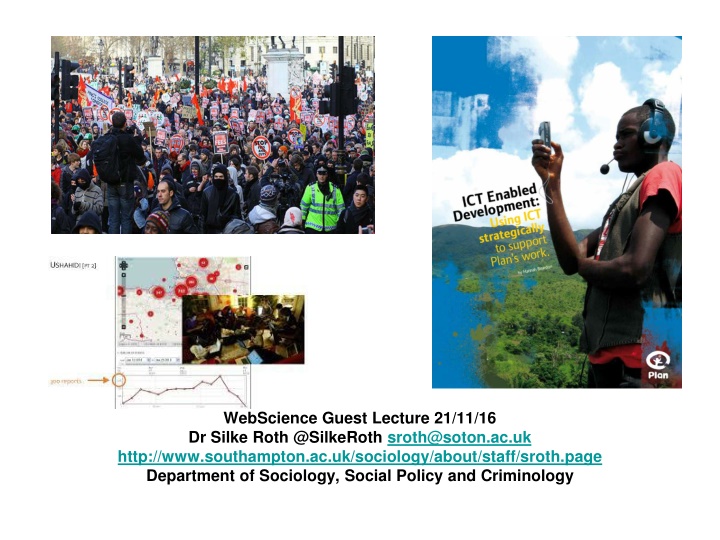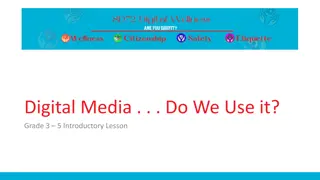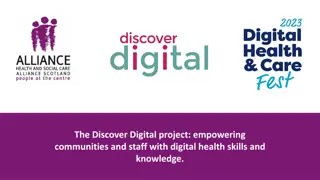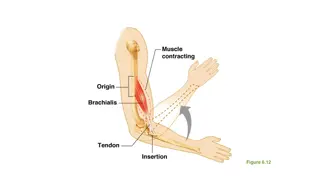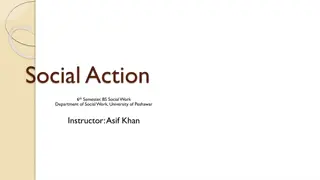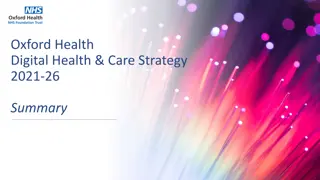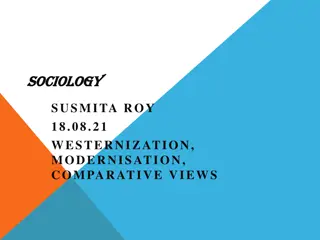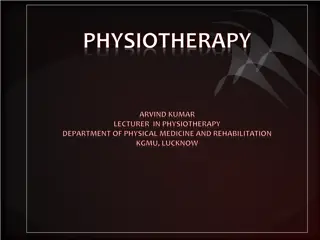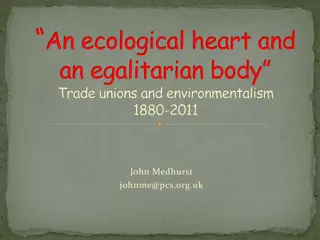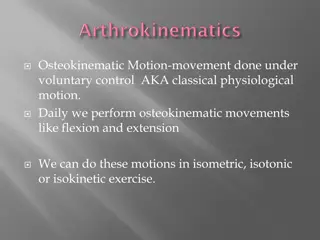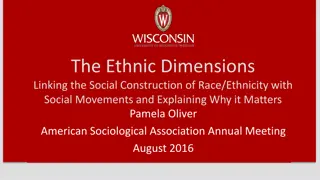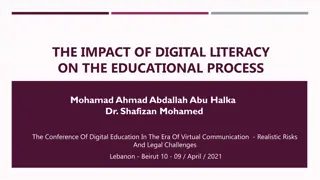Dr. Silke Roth - Social Movements and Digital Humanitarianism
Dr. Silke Roth's research interests include meaningful work, activism, social justice, digital inequalities, intersectionality, social movements, protest, and digital humanitarianism. Explore the causes and outcomes of social movements, as well as the power dynamics and electronic repertoires of contention.
Uploaded on Feb 22, 2025 | 1 Views
Download Presentation

Please find below an Image/Link to download the presentation.
The content on the website is provided AS IS for your information and personal use only. It may not be sold, licensed, or shared on other websites without obtaining consent from the author.If you encounter any issues during the download, it is possible that the publisher has removed the file from their server.
You are allowed to download the files provided on this website for personal or commercial use, subject to the condition that they are used lawfully. All files are the property of their respective owners.
The content on the website is provided AS IS for your information and personal use only. It may not be sold, licensed, or shared on other websites without obtaining consent from the author.
E N D
Presentation Transcript
WebScience Guest Lecture 21/11/16 Dr Silke Roth @SilkeRoth sroth@soton.ac.uk http://www.southampton.ac.uk/sociology/about/staff/sroth.page Department of Sociology, Social Policy and Criminology
Overview Research interests Meaningful work, activism Social justice Digital inequalities, intersectionality Part 1 Social Movements and Protest Part 2 Digital Humanitarianism & ICT4D
Part 1: Social Movements A social movement is a conscious, collective, organized attempt to bring about or resist large-scale change in the social order by non- institutionalized means. Cohen and Kennedy (2007) Global Sociology, p. 437
Some Causes of Social Movements (Perception of) Social Inequality and Change Political Opportunity Regime Crises, Decline in Repression Prior Organisation and Collective Identity Cross-cutting solidarities Leadership Availability Communication Networks Belief in Necessity and Effectiveness Frame Alignment and Alignment Skill Lofland (1996) Social Movement Organizations. Guide to Research on Insurgent Realities
Outcomes of Social Movements Political and Policy Outcomes Mobilization Cultural Outcomes
Tarrow (1994) Power in Movement Repertoires in Contention (Conventional, Disruptive, Violent) Protests, Strikes, Sit-Ins, Blocking Traffic Boycotts, withholding rents or tax Petitions, Lobbying Education (Leaflets, Teach-Ins, Ads) Repertoires of Organisational Form: Small grassroots organisation Large mass membership organisation Coalitions and networks
Electronic Repertoires of Contention Conventional Electronic Contention Representation, information distribution, research, artistic production, fundraising, lobbying, mobilization Disruptive Electronic Contention Email floods, form floods, fax bombs, viruses, worms, trojan horses, data theft or destruction, site alteration or redirection, denial of service, virtual sit-ins Violent Electronic Contention ( cyberterrorism ) Property destruction, human injury or death through gaining control over networked computer control systems (air traffic control, electrical power grids etc.) Sasha Costanza-Chock (2003) in: Representing Resistance: Media, Civil Disobedience and the Global Justice Movement, ed. by Opel and Pompper
Van Laer & Van Aelst (2010) Internet and Social Action Repertoires
Digital inequality/digital literacy Sasha Costanza-Chock (2014) Out of the Shadows, Into the Streets. Transmedia Organizing and the Immigrant Rights Movement. Cambridge, Mass. MIT Press Free download at https://mitpress.mit.edu/books/out-shadows- streets Projects for digital literacy for immigrant workers
Bennett & Segerberg (2012) The Logic of Connective Action Collective action organisational resources, collective identity, collective endeavour Connective action personalised content shared across media networks, individualised, weak tie networks Mix of online media & offline activities example Occupy (Roth, Saunders, Olcese 2014)
Some Literature on Collective & Connective Action Snow, David A., Soule, Sarah A, & Kriesi, Hans Peter (eds). (2007) The Blackwell Companion to Social Movements. HM 131 SNO Mercea, D (2012) Digital prefigurative participation: The entwinement of online communication and offline participation in protest events. New Media & Society Vol. 14, No. 1, p. 153-169. Van Laer, J & Van Aelst, P (2010) Internet and Social Movement Repertoires. Information, Communication & Society,13:8 Bennett, W L & Segerberg, A (2012) The Logic of Connective Action. Information, Communication & Society 15:5,739-768. Castells, M (2013) Networks of Outrage and Hope. Social Movements in the Internet Age. Cambridge: Polity. Diani, M (2000) Social Movement Networks Virtual and Real. Information, Communication & Society 3:3, 386-401. Garrett, R K (2006) Protest in an Information Society (lit review) Information, Communication & Society 9:2, p. 202-224. Harlow, S & Harp, D (2012) Collective Action on the Web Information, Communication & Society 15:2, Farrell, H. (2012). "The Consequences of the Internet for Politics." Annual Review of Political Science 15(1): 35-52. L Illia (2003). Passage to cyberactivism: how dynamics of activism change. Journal of Public Affairs 3(4): 326-337. Arab Spring Wolfsfeld, G., E. Segev, et al. (2013). "Social Media and the Arab Spring: Politics Comes First." The International Journal of Press/Politics 18(2): 115-137. Soengas, X. (2013). "The Role of the Internet and Social Networks in the Arab Uprisings - An Alternative to Official Press Censorship." Comunicar(41): 147-155. Kerton, S. (2012). "Tahrir, Here? The Influence of the Arab Uprisings on the Emergence of Occupy." Social Movement Studies 11(3-4): 302-308. Occupy Journal of Critical Globalisation Studies (2012) issue 5, special issue on Occupy Social Movement Studies (2012) Special Issue on Occupy Roth, S, Saunders, C & Olcese, C (2014) Occupy as a Free Space Mobilization Processes and Outcomes Sociological Review Online 19 (1), February 2014
Part 2: Digital Humanitarianism & ICT4D ICT4Development, E-Health Disaster prevention, Disaster response Crisis-Mapping and Crowd-Sourcing
ICT4D & E-Health Training, promoting public health GPS locating of people and resources Monitoring & impact analysis Financial support via mobile transfers Market platforms for trading Provision of health care to difficult to serve locations Self-management of patient health
Disaster prevention & response Crisis mapping (Meier 2015) Real-time humanitarian crowdsourcing (Munro 2013) Social media data in the disaster context (Murthy & Longwell 2013, Resnyansky 2016, Madianou 2015)
Digital Humanitarianism & E-health Burns, R. (2014). "Moments of closure in the knowledge politics of digital humanitarianism." Geoforum 53(0): 51-62. Burns, R. (2014). "Rethinking big data in digital humanitarianism: practices, epistemologies, and social relations." GeoJournal: 1-14. Burns, R. and J. Thatcher (2014). "Guest Editorial: What s so big about Big Data? Finding the spaces and perils of Big Data." GeoJournal: 1-4. Meier, P. (2011). "New information technologies and their impact on the humanitarian sector." International Review of the Red Cross 93(884): 1239-1263. Meier, P. (2012). "Crisis Mapping in Action: How Open Source Software and Global Volunteer Networks Are Changing the World, One Map at a Time." Journal of Map & Geography Libraries 8(2): 89-100. Sandvik, K. B. (2015). "The humanitarian cyberspace: shrinking space or an expanding frontier?" Third World Quarterly: 1-16. E-health Odine, M. (2015) "South Africa's mobiles deliver healthcare services." Journal of Emerging Trends in Educational Research and Policy Studies 6, 182-188. Vijaykumar, S., R. J. Wray, T. Buskirk, H. Piplani, J. Banerjee, M. Furdyk and R. Pattni (2014). "Youth, New Media, and HIV/AIDS: Determinants of Participation in an Online Health Social Movement." Cyberpsychology, Behavior, and Social Networking 17(7): 488-495.
